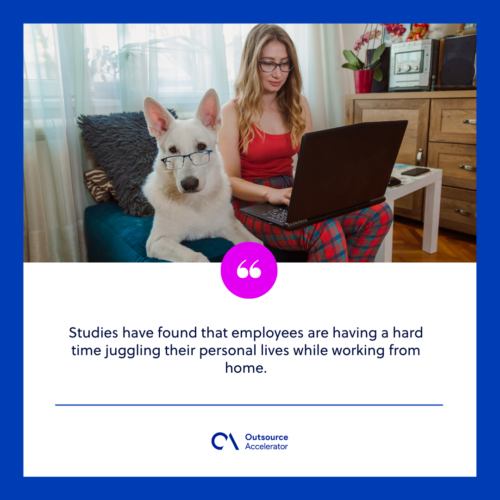The difference between a traditional office and virtual workplace culture

When the pandemic hit every industry last year, we all got mandated by the government to work from home. All for the good of everyone and for public safety.
Most of us had no problem packing up our desks. We exchanged communal office amenities for our own kitchens and DIY tables. From the daily goss by the water cooler to company-mandated group chats.
As employees, there are certain differences that made us take a double look. But that’s not to say that those are necessarily bad.
Public opinion: Which is better, physical or virtual offices?
According to a study by Business News Daily, remote workers are healthier, happier, and more productive. But the work setup has brought up some struggles, most specifically with the work-life balance. Studies have found that employees are having a hard time juggling their personal lives while working from home.
There’s one solution to this problem: taking frequent breaks.
Another study has known that the brain can only focus for up to 45 minutes. Anytime beyond that, you’re cruising on little to no gas already.

The great migration of 2020
The pandemic had office workers clambering to set up their workstations at home. While there are a handful of companies operating 100% remote, most of us had to adjust to working remotely.
It may not come as a surprise, but most companies have seen an upward trend in productivity when they put their employees in a remote environment.
Office culture promotes focus and a can-do attitude while remote working culture promotes self-discipline and accountability. Team building while you’re within your coworker’s arm’s length is way different from attending a Zoom team meeting.
That being said, team leaders are working harder than ever to preserve the office culture.
Tip: Keep in mind that working remotely and working from home isn’t the same approach.

What to expect when working remotely
Expect that people won’t be available to chat beyond their workdays. Expect that your coworkers will be balancing personal errands along with their work responsibilities. Kids, pets, and family members might interrupt video meetings. Power failures may cut down a significant portion of the workday.
With all these, expect that people would be working hard too. Giving their 100% and then some to make up the hours they missed.
How to adjust to WFH
Waking up every morning and realizing that you don’t have to commute to the office is a great way to start your day. But try not to dilly dally and let yourself loose early in the morning.
As an employee, here are some simple ways to help you gracefully transition into the work from home arrangement:
- Stick with your usual routine. Make breakfast, workout, shower, and put on your work clothes. It may be more comfortable to work in your pajamas but it may just lead you to take a nap during the day. Work at home the way you’d work in an office. Log in on time, maintain professionalism, and stay productive.
- Check your agenda. List your responsibilities and prioritize them by urgency. It’ll help you start off your day.
- Catch up with your coworkers. Don’t let the sudden isolation make you lonely. Whenever the load is light, be sure to check up on your friends and colleagues.
For employers, the adjustment period can be a challenge – especially if you’re used to managing your teams in person. Since it looks like the remote work arrangement is here to stay, hopefully the following tips can help:
- Utilize online collaboration tools. Remote work wouldn’t be possible without the use of various online collaboration tools. Luckily, today’s technology provides a wide range of options on communication and collaboration tools.
- Invest in data security. When you’re sure that your data and confidential information are protected, you’ll feel more at peace while working remotely.
Remote work had blurred the line between work and life. But don’t let the extra obligations and responsibilities take you away from the things that matter most.







 Independent
Independent




